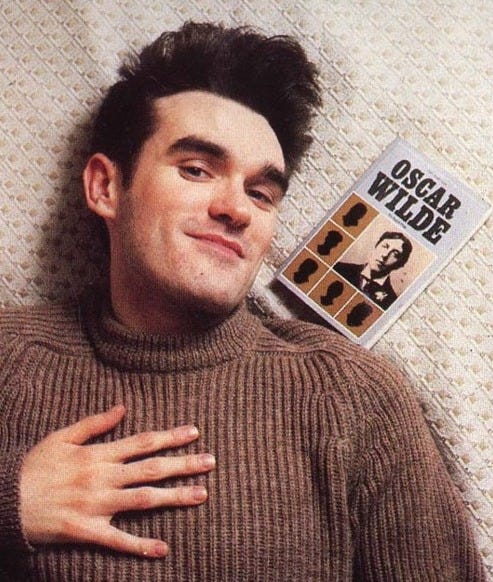Today at Grimrose Manor, we pay tribute to Oscar Wilde’s gothic literary masterpiece and sole novel, The Picture of Dorian Gray. First published as a novella 135 years ago this month, in July 1890—an expanded version was released the following year. Controversial then and now, the book has had an enormous influence on pop culture and its philosophical questions remain relevant to this day.
I won’t go into details (or give spoilers!) but if you’re not familiar, the book’s premise is that the young and beautiful main character wishes a portrait painted of him would age in his stead and this de facto Faustian bargain leads to his demise. Dorian essentially has a proverbial angel on one shoulder and a devil on the other, being heavily influenced by both Basil Hallward, the artist who adoringly paints his portrait, and Lord Henry Wotton, Hallward’s philosophical friend who plants hedonistic ideas in Dorian’s mind.

My personal obsession with Oscar Wilde began in junior high, thanks to Morrissey, then-lead singer of The Smiths. His admiration for Wilde was made apparent through his lyrics and explored in many an interview. (Say what you will about Moz, he introduced a lot of fans to great literature.) Wilde’s sardonic wit, penchant for the dark and dramatic, and willingness to expose society’s hypocrisy, proved an irresistible invitation to a precocious, disaffected youth like myself.
Today, my collection of Wilde-related books has reached 80+ volumes—including more than 25 editions of The Picture of Dorian Gray. (Although, an article of cover illustrations brought recognition that I don’t yet possess any foreign language versions—a significant oversight.) I’ve pilgrimaged to a number of Wilde’s former residences in London and Dublin, and even had the good fortune to meet his only grandson, Merlin Holland. Still on my bucket list is to visit Oscar Wilde NYC, a bar that opened in 2017.

Although it’s truly a morality tale (in which karma eventually catches up to the protagonist) controversy has followed the book throughout its 135 years—largely due to the novel’s gay subtext and its author’s unconventional reputation. Dorian Gray has been widely banned, and even more sadly, its misinterpretion as a celebration of debauchery led to quotes being used as evidence in Wilde’s trials five years after publication.
In a letter, Wilde shared that each of the characters revealed aspects of himself: “Basil Hallward is what I think I am: Lord Henry what the world thinks me; Dorian Gray what I would like to be—in other ages, perhaps.” In a demonstration of early cancel culture, Wilde was found guilty of “gross indecency” and sentenced to two years’ hard labor, losing his family, health, and livelihood, and dying three years later in exile.
“The books that the world calls immoral are books that show the world its own shame.”
~Oscar Wilde, The Picture of Dorian Gray
Despite this tragic real-life outcome (or potentially as a result), The Picture of Dorian Gray’s immense influence on pop culture continues to this day. In addition to a stream of film and television adaptations, the story has also inspired a variety of songs (see playlist below), countless paintings and illustrations, and modernized retellings. Most notably, actress Sarah Snook recently won the Tony award for Best Actress in a Play for her 14-week Broadway run, in which she played all 26 characters.
We grapple daily with our culture’s obsession with youth, beauty, and the Instagrammable; our pleasure-seeking addictions and inability to delay gratification; the corruptible self-interest and moral hypocrisy of our ruling class. Few would argue that this allegory doesn’t directly relate to the core of our modern experience.
We need opportunities like these to ask ourselves: How would we behave if we could avoid consequences? How would we treat others if we could stay anonymous or avoid accountability? How far would you go to seek your own comfort and pleasure? What does it mean to pursue happiness while living a life of integrity?






Have you seen Oscar Wilde's grave at Pere Lachaise? Cool stone and lots of tokens left by visitors. Comforting to see him receiving so much love knowing the trials he faced at the end of his life.